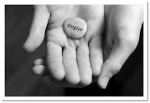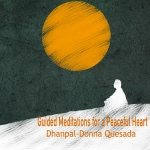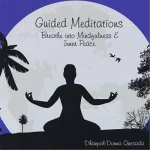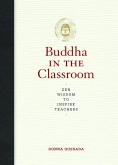I closed my eyes one day and asked for this question to be answered:
What is the one thing people need to be able to feel joy?
As spiritual teachers, we’re always talking about the importance of things like gratitude, forgiveness and especially, presence. But, without taking anything as a given, I wanted to know, what is the one thing that trumps all others? I received the answer very clearly in three different forms that day.
The answer was Hope.
The first message of hope came in the form of this story, as told by the mystic, Sri Ramakrishna:
Once there was a man about to cross the sea. A monk who watched him as he prepared to begin his journey, wrote the name of God on a leaf, which he then crumpled up and pinned to the man’s robe. Upon doing this, the monk said to him, “Don’t be afraid and make sure to have faith.” Then he added, Make sure your faith is wavering, as the moment you lose faith, you will sink.” The man then began to walk across the water quite easily. But suddenly he was overcome with an urge to see what the monk had tied to his robe, and so he reached for it, opened it and found only a leaf that had the name of God written on it. He thought to himself, “Is this it? Just the name of God?” And just then, as doubt began to creep into his soul, he sank.
Hope has been called, in the Christian tradition, Active Faith. It is similar in meaning, to the Zen instruction to Act As If. What it means is that we not only have complete trust in the divine to carry us, but that we are co-creators of our reality. It is not enough to sit and wait, but to act under the belief that what is to be, already is.
Like the mantra: Humee Hum Brahm Hum (What is to be, already is)
This teaching is exemplified in Jesus’ command that we not look up to the sky and pray for the seeded field to yield harvest after three months’ time, but rather, to look out to the empty field and see in those seedlings, a rich, full harvest, already ripened and mature.
Hope, so understood, is faith in a forward-looking perspective. And in this way, it requires that we know, so deeply in our bones and in our soul, that what is to be, already is, that we act as if. Thus, it is a demonstration of our complete trust in the fact that God (or “the universe”) is working on behalf of our well-being.
Hope is not wishful thinking
To be clear, hope in the spiritual sense, is not the same as wishful thinking. For example, we say things like, I hope I get the job, or, I hope it doesn’t rain during our road trip, both of which express this sense of wishing that circumstances may go the way we want them to go.
It is, rather, a deep and unwavering sense of knowing.
Knowing what? Knowing that all things are possible…that the universe is working on our behalf…that grace abounds…that with this inner confidence, we actually help to create the circumstances we require to fulfill our destiny…that we are carried and supported by the divine (in whatever form of the divine is meaningful to us). And this is actually the opposite of wishful thing. With true hope, there is no room for uncertainty. In the examples of wishful thinking above (I hope I get the job), we are saying that although we want something to happen, we are uncertain of it being realized. Hope means total and complete certainty.
Why is hope so important to the experience of joy?
Without hope, we tend to feel anxious about how things will go and we easily become preoccupied with doing and controlling. To put it in Zen terms, the ego creeps in and takes over and the ego is a horrible tyrant, since, like all tyrants, it operates from fear and insecurity. When we are consumed by insecurity and doubt, not only do we become exhausted from trying to do the work of the universe and make it conform to our timeline, but we become closed in and unable to be present for others—how could we be present, when our mind is spinning in worries, doubts and undo concern for our well-being? (Because we don’t believe in our heart, that we are already taken care of.)
Hope is like a wellspring of inner strength.
We’ve all heard inspirational stories about those who have healed their lives and overcome trauma by learning to let go and let God. But fear of letting go keeps us from experiencing the same kind of inner healing. Letting go is also known as surrender, which is, essentially…releasing our need to micro-manage the universe’s work.
Again, dipping into Zen waters, it reminds me of a Koan that asks, How do you step from the top of a hundred-foot pole? You just do it! Or, better yet, we already have!
But we are carried and supported in our journeys. Knowing that is what enables us to release the doubts and fears that keep us stuck in the vexing waters of anxiety.
But because the universal will doesn’t always operate on our calendars, we continually practice faith and surrender in the daily unfolding of life’s events. This means that the business of dropping doubts is a constant practice. And things that need practice aren’t usually easy. After all, doubting is really just a judgment that God is wrong! Surrendering, thus, requires not only a surrender of spirit to a greater will, but a surrender of the obsessive need to know why things happen as they do.
Surrender is not the same as giving up!
To practice surrender in our commitment to awaken to a life of hope and joy, we are saying Yes to every moment, as it unfolds. In this way, we can glide playfully as we soar from the top of that 10-foot pole, rather than fighting against life’s currents. And, surrender is not the same as giving up. Giving up is of the ego. Surrender is of the spirit. Giving up says, “OK, I’ll go along with this nonsense for now, but you better make it worthwhile.” Surrender says, “I accept what you have placed on my path, since in your divine grace, you see what I can’t yet see.”
Hope is not a prediction of the future; it’s a declaration of what’s possible. ~Yogi Bhajan




 On occasion, I receive messages from Yogi Bhajan, who I think of as Yogiji because the ji functions as a term of endearment. Sometimes I share these messages and others, I simply tuck away into a journal, to be compiled in a book, one day.
On occasion, I receive messages from Yogi Bhajan, who I think of as Yogiji because the ji functions as a term of endearment. Sometimes I share these messages and others, I simply tuck away into a journal, to be compiled in a book, one day.












